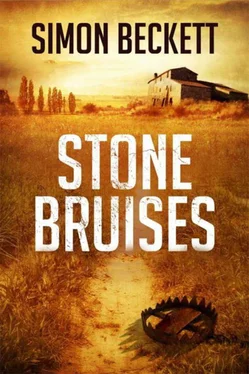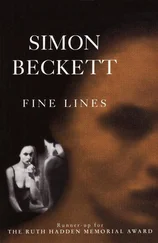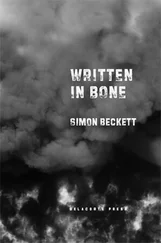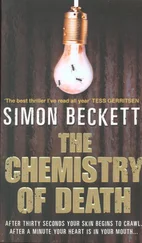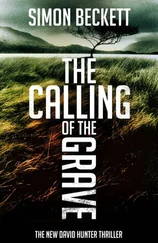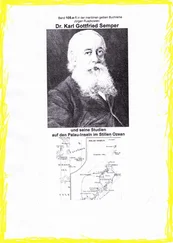The woman’s hair is tucked behind an ear.
My first thought is that it’s Mathilde, that this is further confirmation of who Michel’s father is. Then I look again and I’m not so sure. There’s a dot on one cheek that could be a dimple, and I’ve occasionally seen Gretchen tuck her hair back in an unconscious echo of her sister. But the drawing is so primitive it’s impossible to tell who it’s supposed to be. If anybody: for all I know it could be a random doodle.
I guiltily snap the notebook shut when a noise comes from outside. It’s only Georges, though. The old man is trudging across the bottom of the courtyard, a clanking bucket in each hand. I smile ruefully at my reaction. That’ll teach you . Turning to a clean page, I begin jotting down what I need.
When I’ve finished I go back to the house. The door is open and Mathilde is busy dissecting a skinned rabbit. The bowl of freshly picked beans is beside her as she cuts and twists, deftly separating a leg joint.
‘I’m ready when you are,’ I say.
There’s a snort from the other side of the room, which is hidden behind the open door. ‘About time. It’s taken you long enough.’
I didn’t realize Arnaud was there. I push the door further back so I can see him. He’s sitting at the scarred dining table with a large cup of coffee, Michel on his knee gnawing at a crust of bread.
‘It’s a big house,’ I say, stung despite myself.
‘Not that big. Makes me wonder what you do up on that scaffold all day.’
‘Oh, you know. Sunbathe, read. Watch TV.’
‘It wouldn’t surprise me. You’re certainly not doing much work.’
There’s no real heat in the exchange. The bickering between us has become almost routine. It doesn’t mean we like each other.
Arnaud feeds a coffee-soaked crust to Michel. ‘He shouldn’t have that,’ Mathilde tells him.
Her father chuckles as his grandson crams the soggy mulch into his mouth. ‘He likes it. He knows what’s good for him.’
‘He’s too young.’
Arnaud is already dipping another piece. ‘It’s only coffee.’
‘I don’t want—’
The flat of Arnaud’s hand cracks on the table.
‘Are you deaf ?’
Michel jumps at the shout, his face puckering. Arnaud gives Mathilde a final glare.
‘Now look what you’ve done!’ He bounces the baby up and down on his knee, his voice and expression softening as soon as he turns to his grandson again. ‘Shh, there’s a man. Here, there’s plenty more.’
Michel grasps the soggy piece of bread he offers and smears it around his mouth. Mathilde silently finishes disassembling the rabbit. The stiffline of her back and the red flush on her neck are her only protest.
A door at the back of the kitchen opens and Gretchen enters. She smiles when she sees me, which is enough to spoil Arnaud’s good humour.
‘What are you grinning at?’ he demands as she saunters across the room.
‘Nothing.’
‘Doesn’t look like nothing to me.’
‘I can smile if I want to, can’t I?’
‘It depends what at.’
His eyes go from his younger daughter to me, sharp and suspicious. There’s a world of difference between the posturing grumpiness of a moment ago and the hostility I’m confronted with now. The atmosphere in the kitchen is suddenly charged; even Michel falls silent as he looks up at his grandfather.
Then Mathilde comes and stands between us. It’s done so casually it could be accidental.
‘You wait by the van while I get the keys,’ she says.
I’m not sorry to go. I close the door behind me but I’ve gone only a few steps when there’s the muffled sound of breaking crockery, followed by the siren of Michel’s crying. I carry on across the courtyard to the van.
Just another day chez Arnauds.
Mathilde’s face gives nothing of her feelings away when she emerges from the house. She comes over and holds out a set of keys.
‘The big key is for the padlock on the gate. You’ll need to lock it behind you.’
‘You’re not coming?’
‘No.’ Her usual inscrutability seems strained. ‘You can drive?’
‘Yes, but…’ I wasn’t expecting this. I wasn’t looking forward to going, but thought at least Mathilde would be coming with me. ‘I don’t know where to go.’
‘The builders’ yard isn’t far from the garage. Keep following the road until you reach the town square. It’s on your right just after that.’
She’s still holding out the keys. I take them reluctantly, still searching for objections. ‘What about my foot?’
‘The pedals are well spaced. You should be able to manage.’ She opens the wallet-like purse and pulls out a few notes. ‘That should be enough for cement and whatever else you need. I’d give you an advance on your wages, but my father…’
‘It doesn’t matter.’
I’m too taken aback by this new development to care. Mathilde seems uncomfortable as well. As she turns away, she pushes her hair behind her ear. I’m reminded briefly of the drawing, but I’ve more pressing worries than Mathilde’s private life.
Even though it’s still early the inside of the van is stale and hot. I prop my walking stick on the passenger side, then slide behind the wheel and try my bandaged foot on the pedal. Provided I don’t snag the homemade shoe, it should be OK. Fastening the seatbelt prompts an unwelcome flare of memory, so I distract myself by checking the controls. I try the pedals again, then waste some more time adjusting the seat before I accept I’m only putting things off.
I turn the key.
The engine catches on the third attempt, rattling and roaring as I pump the accelerator to keep it from dying. When it’s settled to a steady grumble I lower the window and slowly drive out of the courtyard. The gears are stubborn. I bump along the track’s uneven surface in second. When I reach the gate I go through the time-wasting routine of opening it and driving through, then getting out of the van again to padlock it behind me. I climb back into the van and sit with the engine running, looking at the open road. Get on with it, I tell myself.
There are a few other cars about but not many. The old Renault is reluctant to come out of second. The gear lever is a fiddly thing that juts out from the dashboard, and the engine roars as I force it into third then up to fourth. There’s no fifth gear, but the old van cruises along happily enough once it’s got used to the idea. I point it straight down the grey strip of tarmac, heading into the heat-haze that retreats as fast as I head towards it. Already I can’t understand what I was so anxious about. I relax into the seat, beginning to enjoy myself.
My sunglasses give the parched countryside on either side a blue tint, deepening the sky to an improbable sapphire. I lean my arm out of the window, enjoying the breeze as the wheat fields whip past, until I realize how fast I’m going. Reluctantly, I slow down: the last thing I want is to be stopped for speeding.
Some of my tension returns as I near the garage and bar where Mathilde and I stopped. But there’s no one outside, and it’s gone in a flash. Given the evident tensions between her father and his neighbours, I can’t blame her for not wanting to come into town with me. Although calling it a town is flattering it, I see as I drive into it. It’s not much more than a village. There are a few houses and shops that open directly onto the narrow pavement, and then I’m at the main square. It’s small but pleasant enough, with plenty of trees for shade and a fountain in front of a boules court, on which two old men are already tossing steel balls at a tiny jack.
The open-fronted builders’ yard is down a side street but still visible from the road. I park by the piles of sand, bricks and timber outside a corrugated, hangar-like building and go inside. Pallets of cement and plaster are stacked head-high against the walls. I buy what I need and then awkwardly load the heavy bags of cement into the back of the van. It’s tricky, since I can’t use my stick, and no one working there seems in any hurry to help. But I don’t mind. My earlier anxiety has gone. In its wake comes a glow of confidence, born from relief as much as anything. As I drive back to the square I’m actually sorry to be returning to the farm so soon. When I see a parking space up ahead it occurs to me that I don’t have to.
Читать дальше
